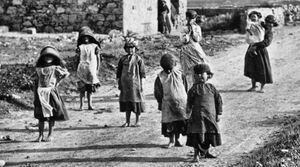‘Whip these children to teach them manners,’ was the Edwardian way.
THERE is a perception that compared with Victorian and Edwardian times, modern Guernsey is not the peace-loving, law-abiding island it once was.

In fact, it’s quite the opposite, as Edward supplanted his mother on the throne, our little island – or more specifically St Peter Port – was a fairly lawless place.
If the local lads weren’t up to no good, rogue elements of the garrison would be fighting, throwing people into the harbour and generally being a pain in the behind.
Throw in the French ladies of the night and notoriously mouthy house-owners in Cornet Street, and Town was more spicy than it ever has been.
Out of Town, they often got up to no good too, not least the coastal children who, in 1902, offended the ‘By The Way’ writer in the Guernsey Evening Press to such an extent that he suggested a few whippings might be in order.
It was the Vale miscreants that first got his dander up.
‘I had occasion recently to visit L’Ancresse Common and found that boys are still allowed to hang about the gate at Pont Allaire [remember the common area was gated off on all sides at that time] and plague passers-by, who happen to be riding or driving, demanding a penny to open the gate.’
But it wasn’t just there, as Mr Grumble plonked in front of a bulky typewriter, pointed out:
‘At numerous places along the coast the children are allowed to run after carriages and beg money from the occupants.
‘Several visitors at a first-class hotel were recently plagued in this manner and at the dinner table in the evening, the circumstance formed the topic of conversation. The general opinion expressed was that it was demoralising to the children and should be repressed by law.’
Old Mr Grumble, wouldn’t stop there though, as he wrote:
‘The constables of the parishes bordering the western sea-coast ought to make an example of a few of these children and produce them together with their parents, before the Police Court. Otherwise the evil will grow.’
He still wasn’t finished. His cage had been vigorously rattled and in the same page one column wrote:
‘Only a week ago I was informed that some [local] boys were bathing in Vazon Bay and on the approach of a number of carriages conveying a picnic party, ran after it in a state of nudity.
‘As the party comprised a number of ladies, the drivers threatened the boys with their whips.
‘A more intimate acquaintance with a whip might teach these children better manners.’
Almost weekly, the opinionated were penning letters to the paper to complain about Guernsey’s decadence and decay.
More police, was the call from readers and Press leader writer alike:
Take this Weekly Press comment from October 1902:
‘This is perhaps the pithiest and most pointed epithet one can apply to the tactics of those responsible for the nocturnal hooliganism, both in town and country, to which we have already repeatedly had occasion to regretfully refer.
It would appear, judging by well-authenticated reports received from various districts that there have been quite a number of cases of molesting women and children after dusk; apart from the manifestations of hooliganism; and that, despite the example made of some offenders, these appear not to have been far from even nipped in the bud.
The country parochial police system is, of course, absolutely incapable of coping with such dastardly outbreaks, but it is noteworthy a few organised bands of "scouts’’ [not the dib-dib-dib brigade] are said to be on the watch for the cowardly ruffians in at least certain specified places nightly.
‘The most permanent remedies are in the hands of the ratepayers, for more police should undoubtedly be provided, even let the cost be what it may; while the better lighting of the rural roads is assuredly an absolute necessity.’





